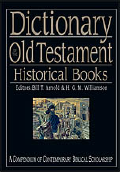
As I’ve been writing about various aspects of Old Testament narratives—worship practices, pagan religion, daily life, etc.—I’ve been looking up subjects that are not always easy to get clear information about. Many of these things are shrouded in mystery or clouded in the uncertainty of scholarly debate. General Bible dictionaries tend to focus on what we know for certain, which means they often lack the depth or detail I’m looking for. The larger, more encyclopedic dictionaries offer greater depth and detail, but even the most recent are typically several decades old. If I’m dealing with something that is still being debated or reevaluated in the light on ongoing discoveries, I want the most recent information I can get.
That’s where the IVP Old Testament dictionaries have proven really helpful. When I look up Canaan or Baal, for example, I find a concise summary of more recent discoveries and what they mean for the current state of the discussion. It’s detailed enough that I feel I can understand and evaluate various arguments, yet concise enough that I don’t get bogged down in the scholarly minutiae.
In short, I’ve been extremely impressed with how helpful these dictionaries are. If you’re preaching or teaching through the Pentateuch or Historical Books and you want solid information about the people, places, events, and practices they mention, do yourself a favor and pick up these two dictionaries.


